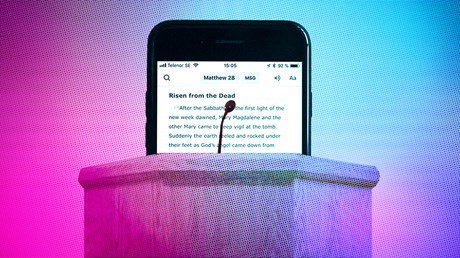Postliterate people still need God’s Word, and online Bible ventures have found eager listeners.
Suppose you agree that ours is an increasingly postliterate age. The average person, including the average Christian, is reading less, and Christians of all ages, especially the young, lack the basics of biblical literacy. Is that all there is to say? Is hunger for Scripture simply dying out?
By no means. Of all tech pessimists I may be chief, yet few things excite me more than what’s happening online with the Bible. What we see is not declining interest in Scripture but an explosion of it. The question is not, therefore, whether people still need and actively seek nourishment from God’s Word but how best to get it to them.
Let me share a snapshot of some promising attempts to give an answer—to meet the world’s deep hunger with the pleasures, depths, and inexhaustible beauties of the Word of God. Call them “digital lectors.” In the preliterate era, most believers never read the Bible for themselves but heard it read aloud in the gathered assembly of worship. Those who read the Word were called lectors, which is Latin for “readers” and a term still used in liturgical traditions.
Online, new lectors are meeting the moment, presenting the Bible in fresh and creative ways. Sometimes, in a lovely closing of the ancient circle, they aren’t explaining or expounding the text, just reading it aloud. Either way, people are listening.
Let me begin with three overarching themes before turning to specific examples. The first and happiest thing to say about these online Bible ventures is that they are ecumenical. Protestants, Catholics, and Orthodox are all rising to the occasion, using a mix of audio, video, and animation. So far as I can tell, there is little …
